新视野大学英语4第二版课文及翻译Unit6
新视野大学英语第二版第四册课文翻译
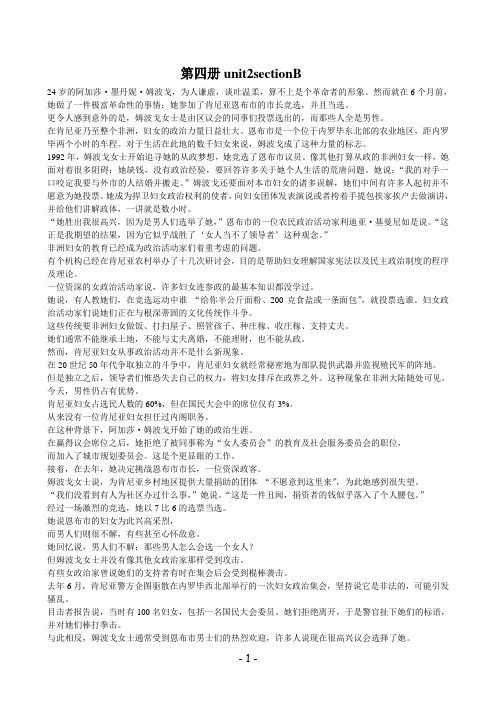
第四册unit2sectionB24岁的阿加莎·墨丹妮·姆波戈,为人谦虚,谈吐温柔,算不上是个革命者的形象。
然而就在6个月前,她做了一件极富革命性的事情:她参加了肯尼亚恩布市的市长竞选,并且当选。
更令人感到意外的是,姆波戈女士是由区议会的同事们投票选出的,而那些人全是男性。
在肯尼亚乃至整个非洲,妇女的政治力量日益壮大。
恩布市是一个位于内罗毕东北部的农业地区,距内罗毕两个小时的车程。
对于生活在此地的数千妇女来说,姆波戈成了这种力量的标志。
1992年,姆波戈女士开始追寻她的从政梦想,她竞选了恩布市议员。
像其他打算从政的非洲妇女一样,她面对着很多阻碍:她缺钱,没有政治经验,要回答许多关于她个人生活的荒唐问题。
她说:“我的对手一口咬定我要与外市的人结婚并搬走。
”姆波戈还要面对本市妇女的诸多误解,她们中间有许多人起初并不愿意为她投票。
她成为捍卫妇女政治权利的使者,向妇女团体发表演说或者挎着手提包挨家挨户去做演讲,并给他们讲解政体,一讲就是数小时。
“她胜出我很高兴,因为是男人们选举了她,”恩布市的一位农民政治活动家利迪亚·基曼尼如是说。
“这正是我期望的结果,因为它似乎战胜了‘女人当不了领导者’这种观念。
”非洲妇女的教育已经成为政治活动家们着重考虑的问题。
有个机构已经在肯尼亚农村举办了十几次研讨会,目的是帮助妇女理解国家宪法以及民主政治制度的程序及理论。
一位资深的女政治活动家说,许多妇女连参政的最基本知识都没学过。
她说,有人教她们,在竞选运动中谁“给你半公斤面粉、200克食盐或一条面包”,就投票选谁。
妇女政治活动家们说她们正在与根深蒂固的文化传统作斗争。
这些传统要非洲妇女做饭、打扫屋子、照管孩子、种庄稼、收庄稼、支持丈夫。
她们通常不能继承土地,不能与丈夫离婚,不能理财,也不能从政。
然而,肯尼亚妇女从事政治活动并不是什么新现象。
在20世纪50年代争取独立的斗争中,肯尼亚妇女就经常秘密地为部队提供武器并监视殖民军的阵地。
新视野大学英语第二版读写教程第6单元课文

•
第一大类是那些为政治目的或为获得大宗合同所付出的大笔 款项。比如,有一家美国企业曾因可能违反美国商业法规而受调 查,当时它捐出一大笔款项支持一位总统候选人。后来发现,这 家公司也打算资助美国推翻智利政府的秘密行动。
• para6 • In this category, we may also include large payments made to ruling families or their close advisers in order to secure arms sales or major petroleum or construction contracts. In a court case involving an arms deal with Iran,
• 假定在一场与政府官员的谈判中,贸易部长向你明确表示如能 给他一大笔贿赂,那么你的商品拿到进口许可证就会容易得多, 还可能避免他所说的“程序上的延误”。现在的问题是:你是 被迫掏钱呢,还是坚持原则?
• Para3
• It is easy to talk about having high moral standards but, in practice, what would one really do in such a situation? Some time ago a British car manufacturer was accused of operating a fund to pay bribes, and of other questionable practices such as paying a exaggerated commission, offering additional discounts, and making payments to numbered bank accounts in Switzerland.
新视野大学英语 第二版 第四册课文翻译
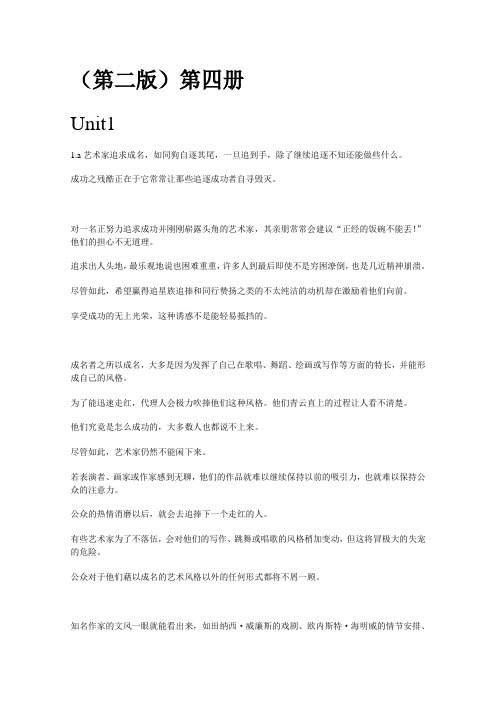
(第二版)第四册Unit11.a艺术家追求成名,如同狗自逐其尾,一旦追到手,除了继续追逐不知还能做些什么。
成功之残酷正在于它常常让那些追逐成功者自寻毁灭。
对一名正努力追求成功并刚刚崭露头角的艺术家,其亲朋常常会建议“正经的饭碗不能丢!”他们的担心不无道理。
追求出人头地,最乐观地说也困难重重,许多人到最后即使不是穷困潦倒,也是几近精神崩溃。
尽管如此,希望赢得追星族追捧和同行赞扬之类的不太纯洁的动机却在激励着他们向前。
享受成功的无上光荣,这种诱惑不是能轻易抵挡的。
成名者之所以成名,大多是因为发挥了自己在歌唱、舞蹈、绘画或写作等方面的特长,并能形成自己的风格。
为了能迅速走红,代理人会极力吹捧他们这种风格。
他们青云直上的过程让人看不清楚。
他们究竟是怎么成功的,大多数人也都说不上来。
尽管如此,艺术家仍然不能闲下来。
若表演者、画家或作家感到无聊,他们的作品就难以继续保持以前的吸引力,也就难以保持公众的注意力。
公众的热情消磨以后,就会去追捧下一个走红的人。
有些艺术家为了不落伍,会对他们的写作、跳舞或唱歌的风格稍加变动,但这将冒极大的失宠的危险。
公众对于他们藉以成名的艺术风格以外的任何形式都将不屑一顾。
知名作家的文风一眼就能看出来,如田纳西·威廉斯的戏剧、欧内斯特·海明威的情节安排、罗伯特·弗罗斯特或T.S.艾略特的诗歌等。
同样,像莫奈、雷诺阿、达利这样的画家,希区柯克、费里尼、斯皮尔伯格、陈凯歌或张艺谋这样的电影制作人也是如此。
他们鲜明独特的艺术风格标志着与别人不同的艺术形式上的重大变革,这让他们名利双收,但也让他们付出了代价,那就是失去了用其他风格或形式表现自我的自由。
名气这盏聚光灯可比热带丛林还要炙热。
骗局很快会被揭穿,过多的关注带来的压力会让大多数人难以承受。
它让你失去自我。
你必须是公众认可的那个你,而不是真实的你或是可能的你。
艺人,就像政客一样,必须常常说些违心或连自己都不完全相信的话来取悦听众。
新视野大学英语(第二版)读写教程4课后翻译答案汉译英
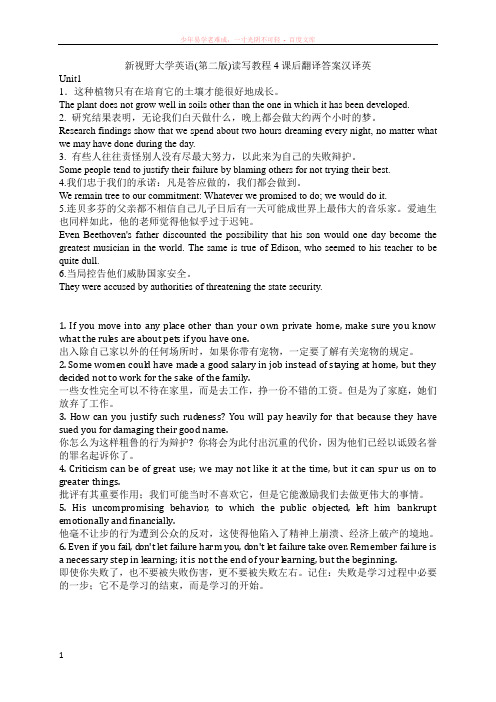
新视野大学英语(第二版)读写教程4课后翻译答案汉译英Unit11.这种植物只有在培育它的土壤才能很好地成长。
The plant does not grow well in soils other than the one in which it has been developed.2. 研究结果表明,无论我们白天做什么,晚上都会做大约两个小时的梦。
Research findings show that we spend about two hours dreaming every night, no matter what we may have done during the day.3. 有些人往往责怪别人没有尽最大努力,以此来为自己的失败辩护。
Some people tend to justify their failure by blaming others for not trying their best.4.我们忠于我们的承诺:凡是答应做的,我们都会做到。
the emotionally and financially.他毫不让步的行为遭到公众的反对,这使得他陷入了精神上崩溃、经济上破产的境地。
6. Even if you fail, d on't let failure harm you, d on't l et failure take over. Remember failure isa necessary step in l earning; it is not the end of your l earning, but the beginning.即使你失败了,也不要被失败伤害,更不要被失败左右。
记住:失败是学习过程中必要的一步;它不是学习的结束,而是学习的开始。
Unit21.要使这部喜剧中的人物更幽默些的话,就会吸引更多的观众。
If the characters in this comedy had been more humorous, it would have attracted a larger audience.2. 她从未对自己的能力失去信心,因此她有可能成为一名成功的演员。
新视野大学英语第四册课文翻译
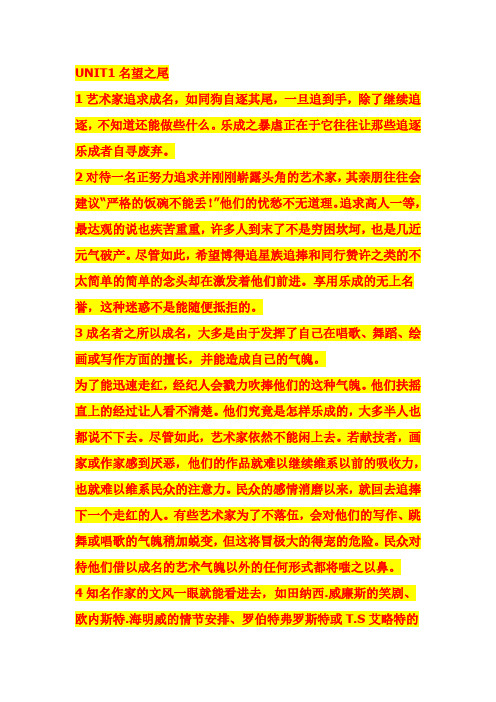
UNIT1名望之尾1艺术家追求成名,如同狗自逐其尾,一旦追到手,除了继续追逐,不知道还能做些什么。
乐成之暴虐正在于它往往让那些追逐乐成者自寻废弃。
2对待一名正努力追求并刚刚崭露头角的艺术家,其亲朋往往会建议“严格的饭碗不能丢!”他们的忧愁不无道理。
追求高人一等,最达观的说也疾苦重重,许多人到末了不是穷困坎坷,也是几近元气破产。
尽管如此,希望博得追星族追捧和同行赞许之类的不太简单的简单的念头却在激发着他们前进。
享用乐成的无上名誉,这种迷惑不是能随便抵拒的。
3成名者之所以成名,大多是由于发挥了自己在唱歌、舞蹈、绘画或写作方面的擅长,并能造成自己的气魄。
为了能迅速走红,经纪人会戮力吹捧他们的这种气魄。
他们扶摇直上的经过让人看不清楚。
他们究竟是怎样乐成的,大多半人也都说不下去。
尽管如此,艺术家依然不能闲上去。
若献技者,画家或作家感到厌恶,他们的作品就难以继续维系以前的吸收力,也就难以维系民众的注意力。
民众的感情消磨以来,就回去追捧下一个走红的人。
有些艺术家为了不落伍,会对他们的写作、跳舞或唱歌的气魄稍加蜕变,但这将冒极大的得宠的危险。
民众对待他们借以成名的艺术气魄以外的任何形式都将嗤之以鼻。
4知名作家的文风一眼就能看进去,如田纳西.威廉斯的笑剧、欧内斯特.海明威的情节安排、罗伯特弗罗斯特或T.S艾略特的诗歌等。
异样,像莫奈。
雷诺阿、达利这样的画家、希区柯克、费里尼、斯皮尔伯格、陈凯歌或张艺谋这样的电影制作人也是如此。
他们明显特殊的艺术气魄标志着与他人不同的艺术形式上的重大改良,这让他们名利双收,但也让他们付出了代价,那就是?失了用其他气魄或形式呈现自我的自在。
5名望这盏聚光灯可比寒带丛林还要炙热。
骗局很快会被透露,过多的关怀带来的压力会让大多半人难以蒙受。
它让你?失自我。
你必需是民众认可的那个你,而不是真实的你,或是可能的你。
艺人,就像政客一样,必需往往说些愿意或连自己都不完全自负的话来取悦听众。
6一滴名望之水有可能玷污人得心灵这一整口井于是乎,一个艺术家若能维系真我,会格外让人赞叹你可能答不下去哪些人没有调和,却仍在这场名利的游戏中获胜。
新视野大学英语视听说教程(第二版)第四册原文和参考答案修正版unit6
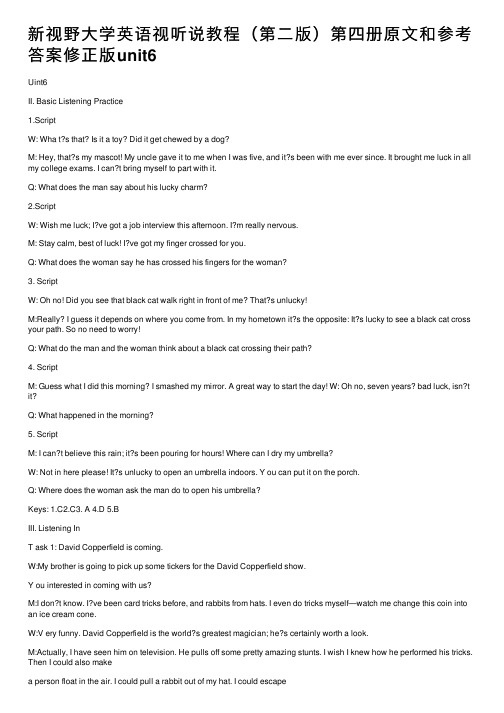
新视野⼤学英语视听说教程(第⼆版)第四册原⽂和参考答案修正版unit6Uint6II. Basic Listening Practice1.ScriptW: Wha t?s that? Is it a toy? Did it get chewed by a dog?M: Hey, that?s my mascot! My uncle gave it to me when I was five, and it?s been with me ever since. It brought me luck in all my college exams. I can?t bring myself to part with it.Q: What does the man say about his lucky charm?2.ScriptW: Wish me luck; I?ve got a job interview this afternoon. I?m really nervous.M: Stay calm, best of luck! I?ve got my finger crossed for you.Q: What does the woman say he has crossed his fingers for the woman?3. ScriptW: Oh no! Did you see that black cat walk right in front of me? That?s unlucky!M:Really? I guess it depends on where you come from. In my hometown it?s the opposite: It?s lucky to see a black cat cross your path. So no need to worry!Q: What do the man and the woman think about a black cat crossing their path?4. ScriptM: Guess what I did this morning? I smashed my mirror. A great way to start the day! W: Oh no, seven years? bad luck, isn?t it?Q: What happened in the morning?5. ScriptM: I can?t believe this rain; it?s been pouring for hours! Where can I dry my umbrella?W: Not in here please! It?s unlucky to open an umbrella indoors. Y ou can put it on the porch.Q: Where does the woman ask the man do to open his umbrella?Keys: 1.C2.C3. A 4.D 5.BIII. Listening InT ask 1: David Copperfield is coming.W:My brother is going to pick up some tickers for the David Copperfield show.Y ou interested in coming with us?M:I don?t know. I?ve been card tricks before, and rabbits from hats. I even do tricks myself—watch me change this coin into an ice cream cone.W:V ery funny. David Copperfield is the world?s greatest magician; he?s certainly worth a look.M:Actually, I have seen him on television. He pulls off some pretty amazing stunts. I wish I knew how he performed his tricks. Then I could also makea person float in the air. I could pull a rabbit out of my hat. I could escapefrom a straitjacket and handcuffs—all underwater. And I could saw awoman in half.W: A magician never tells his secrets. David attempts the impossible and no one has any idea how he does it. I saw him on TV when he walked throughthe Great Wall of China.M:How could he do that?W: I have no idea, but I know what I saw: He entered a canvas shelter on one side of the wall, and he came out of a canvas shelter on the other side.M:yes, bur was he always in full view of the camera, or did they cut to a commercial or something else?W:Not only was the camera running all the time, but he was hooked up a heart monitor, and you could track his progress as he moved through the wall. M:It?s difficult to know what to believe. I know it?s not possible for him to do that, but…W: It sounds to me like it?s a show worth watching.M: Count me in. Instead of an ice cream cone, I?ll turn my money into a ticket.1.What is the dialog mainly about?2.Which of the following DOESN?T the man mention?3.What did David Copperfield do at the Great Wall of China, according to thewoman?4.Under what condition did David Copperfield go through the Great Wall?5.What does the man finally decide to do?Keys: 1C 2.B 3.A 4.D 5.CFor Reference1. He could make a person float in the air, pull a rabbit out of his hat, escape from astraitjacket and handcuffs—all underwater, and saw a woman in half.2. She thinks Davis Copperfield in the world?s greatest magician and he?s certainlyworth a look.T ask 2: Is it really bad luck?ScriptAre you worried because you have just broken a mirror? Some people believe that breaking a mirror is a (S1) terrible thing to do. They say it will bring you seven years of (S2)misfortune.The reason behind this belief stems the old idea that a person?s soul is in their (S3) reflection, so that if you smash your mirror, you soul will be (S4) damaged too, dooming you do an early death, and not giving you entry to (S5) heaven. Is there any way to reverse this bad luck? Y es—if you very carefully (S6) pick up all the broken pieces of the mirror and throw them into a river or stream, then the bad luck will be”(S7) washed away”..Of all number, 13 is the most associated with bad luck. (S8) Some people claim that the number is bad luck because thirteen people sat down for the Last Supper before Jesus was crucified, and with this in mind few hosts will serve dinner with thirteen at the table. And according to an ancient Norwegian tale, twelve gods had gathered for a feast when a thirteenth, Loke, entered. After the meal, Loke killed Balder, who was the most beloved of all the gods.(S9) Friday the thirteenth of any month is considered especially bad or unlucky, and Friday the thirteenth of March is the worst of them all.The number seven also has some superstition connected to it. It is said that God created the world in seven days, and any association with the number is luck. The seventh son of the seventh son is said to be the luckiest of men, and (S10)When people talk about the “seven-year itch”they mean that every seven years a person undergoes a complete change inpersonality.T ask3: The Status on Easter IslandScriptOne of the greatest mysteries on Earth is the statues on Easter Island. The island is one of the most remote places on Earth, located in the southern Pacific Ocean. It was almost uninhabited when it was discovered on Easter Day in 1722 by a Dutch captain, but it is covered with hundreds of giant statues, each weighing several tons and some standing more than 30 feet tall.Who carved these statures, and how and why were they put there?Nobody knows the answer for sure, but many ate trying to find out. There are manytheories to explain this mystery. It has even been suggested the space aliens may have played a role regarding these giant statues. Another theory relates to the fact that Easter Island was inhabited by Polynesian seafarers, who traveled thousand of miles in their canoes, guided by the stars, the color of sky and the sun , the shapes of clouds, and the presence of birds making flights out to sea seeking food. The Polynesians first arrived on the island in 499A.D.However, the ocean currents which carried them there would mot take them back. They were trapped and, having arrived there, could not leave. The Polynesians probable cared the statues themselves, perhaps as religious symbols.To date, 887 statues have been discovered on the island. However, only a few statues were carried intended destination. The rest were abandoned along the way.The statues appear to have been carved out of the top edge of walls of a volcano on the island. After a statue was carved, it may have been rolled or dragged down to the base of the volcano. Then it was put upright, and ropes were tied around it. Using a pulley system, the statue was moves to its intended destination.At its peak, the population of Eater Island is believed to have reached 11,000. Eventually, the resources of the island were exhausted, and the people resorted to cannibalism, eating one another. Work on the statues stopped and the statues were knocked over. When the first Europeans finally arrived on the island, most of the people lad died out.1.When and by whom was the island discovered?2.Who are mentioned in the passage as possible builders of the statues?3.What is true of the Polynesians on the island according to the passage?4.How many statues ere carried to their intended destination?5. Which of the following would be the most suitable title for the passage?Keys: 1A 2.B3. D 4.D 5BFor Reference.IV. Speaking OutMODEL 1This is a custom that dates back to the ancient Celts.Chris: Sue, do you know why people say, “knock on wood” when they want to avoid bad luck?Susan: It sounds a bit funny. As far as I know,it has a lot to do with ancient Celtic people. They worshipped trees.Chris: Sounds interesting.Susan: They thoughts trees would suck demons back into the ground.Chris:Well, when you think about the deep roots,their belief seems to make some senses.Susan: What?s more, knocking on wood was a way to brag without being punished.People once thought that evil spirits would become jealous if good fortunewas pointed out to themChris: Uh, yes, go on.Susan: well, by knocking on wood three times, the noise could frightened away the evil spirits, and they couldn?t have to rob the braggart of that good fortune Chris: I?m afraid those who don?t know this superstition might be frightened away as well.Susan:Now here?s a test. Do you know how the custom of kissing under the mistletoe originated?Chris:I haven?t the slightest idea, but I?m all ears.Susan:Again this is a custom that dates back to the ancient Celts. Since they worshipped trees, they conducted many of their ceremonies in thewoods in the shade of trees.Chris: Now I see. Probably it?s under these mistletoe trees that weddings took place. Susan: I wish you were standing under some mistletoe right now.Chris: Luckily I?m not. Touch wood.MODEL2 Is there any relationship between superstitions and real life?ScriptChris: It?s strange that so many people are superstitious. There must be some relationship between superstitions and real life.Susan:Y ou know, Richard Wiseman, a British psychologist researched the relationship between superstition and luck.Chris: What did he find? Most people would be interested. At least I would Susan:He polled ,000 people and fond that people who believe themselves to be lucky tend to go for positive superstitions .They may wear a ring as a talisman or often say,”touch wood” for good luck.Chris: Then, what about the unlucky people? Do you mean if they think they ateunlucky, they tend to believe in superstitions abut bad luck.Susan: Y eah. They worry a lot about a broken mirror, a black cat running across their path, and so on.Chris: So what is his point?Susan:His point is that people make their own luck by their attitude to life. So, 49 percent of lucky people regularly cross their fingers, compared to 30 percent of unlucky people. And only 18 percent of lucky people are anxious if they break a mirror. Chris: So, our fate is linked to our attitude rather than to our superstitions.Susan: I think that?s what he is suggesting.Chris: This research seems too complicates. If I were a psychologist, I would conducta survey to find whether 13 really is an unlucky number. I f there ere trafficaccidents or murders on the 13th than on other days, then we have to believe in superstitions.Susan: What if there weren?t?Chris: Then I wouldn?t be superstitious.Susan: What a brilliant idea! I never expected you to be as wise as Solomon. Chris: Well as long as you don?t think I?m a fool.MODEL3 I believe ETs have visited the earth before.ScriptNora: Hey, what?s this picture of yours? It looks like a flying saucer.Chris: It is. I was visited by aliens last week and this is a picture of their spacecraft. Nora: When I look closer, it resembles aliver Frisbee.Chris: But it could have been aliens. I believe ETs have visited the earth befor e. What do you think?Nora:It would be hard to believe otherwise. Projects like the pyramids are difficult to explain away, given the level of technology that was available at the time Chris: That?s for sure. They are mysterious.Nora:When you consider all those “impossibilities, it?s tempting to infer that some highly advanced civilization assisted humans in their construction.Chris: Think about this: if you were abducted by aliens and taken up to their spaceship or something …well…Nora: What do you mean?Chris: I mean, who would believe you? Y ou?d go nuts telling everyone: “It?s true! I was abducted by aliens!”Nora: And everyone would think you were crazy, or just making up a story to get attention.Chris: From what I understand,sometimes these people do go crazy, trying toconvince people about their experiences.Nora: I believe that in some cases they offer pretty good evidence.Chris: So, take a closer look at this picture. Do you still think it?s a Frisbee?Now Your TurnT ask 1SAMPLE DIALOGSimon: Eliza, do you know why people say” keep your fingers crossed”when they want to wish others luck?Eliza: It sounds a bit funny. As far as I know, it?s a lot to do with an ancient Christian belief.Simon: Uh, go on.Eliza:In the Christian belief “making the sign of the cross”would keep away evil spirits and bad luck.Simon: I see. When you think about the cross, sign of Christianity, that belief seems to make some sense.Eliza:That?s true. That?s why children often cross their fingers when they tell a small lie. They want to keep bad luck away, or to avoid being punished. Simon: Sounds interesting. So, I?ll cross my fingers for you before you take the final examination. Eliza:Thank you.Simon: But those who don?t understand this superstition might be puzzledEliza:With interesting communications among nations, more and more people can understand it now.V. Let’s T alkScriptThanks, perhaps, to falling stock markets and unrest in the Middle East, Britons have become even more superstitious than usual, according to a report published today. “There has been a significant increase in superstition over the last month, possible as a result of current economic and political uncertainties,” stated Dr. Dick Armstrong. He launched an Internet Survey of national superstition, and found it to be surprisingly high, even among those with a scientific background. Only more in ten of those surveyed claimed not to be superstitious at all. Three out of four people in Britain feel the need to touch wood, and 65% cross their fingers.It is interesting to note that lucky people were much less superstitious and tended to take constructive action to improve their lives. Conversely, superstitious peopletended to regard themselves as among the less lucky, worried about life, had a strong need for control, and could not tolerate ambiguity.The survey also revealed some unexpected beliefs. For example, one respondent could not stay in the bathroom once atoilet had been flushed.There was no evidence that superstitious ever worked, even, when people were instructed to carry lucky charms for a week. They didn?t feel any luckier or more stratified with their lives at the end of that week than when they started.Armstrong attempted to explain this phenomenon: “When students are preparing for exams with a lucky charm, they may trust the charm, rather than doing some extra revision.”VI. Further Listening and SpeakingT ask1: Horseshoes as a Sign of Good LuckScriptHorseshoes are a traditional sign of good luck. Most people believe this comes from the fact that the horseshoe is shaped like the crescent moon, a period of prosperity and good fortune. One legend has it that the Devil was in disguise and wandering at large, looking for trouble. He happened to call on St. Dunstan, who ea skilled in shoeing horses. St. Dunstan recognized the Devil and tied him to a wall with only his feet free to move. He then set to work shoeing him as though he were a horse, but with such roughness the Devil cried out for mercy. St. Dunstan stopped his work and released the Devil after making him promise never to enter a home on which a horseshoe was fixed. Witches fear horses, so they are also turned away by a door with a horseshoe mounted on it. The big issue regarding horseshoes is whether they should be hungpoints up or points down.The original superstition was that the horseshoe is points up to keep the luck from pouring out. Despite this view most buildings with horseshoes in their sign hang them the opposite way. The Horseshoe Casino in Las V egas hangs its horseshoe with the arc on top. They may be hoping their customers?luck runs out, but this is usually not something you advertise in your sign. Finger rings made of horseshoe nail are said to keep away bad luck. Also, robbing two horseshoes together is said to bring good luck.1.According to the passage, what does the crescent moon represent?2.What did St. Dunstan do to the Devil?3.What did the Devil promise?4.What is the big issue concerning the horseshoe?5.Why is the arc of the horseshoe up at the casino in Las V egas?Keys: 1.A 2.C 3.D 4.C5.BT ask 2: Superstitions or real bad lucks?ScriptJoan: Pass me that mirror, would you? I?ll see if my makeup is OK.Dick: OOOPS!! Sorry I dropped it…but is it you or me that gets the seven years of bad luck?Joan: Y ou, I hope, but probable neither of us. I wonder where that “old wives? tale”originated anyway.Dick: There used to be a lot of superstitions: black cats, ladders, numbers. My parent and grandparents are full of them.Joan: I agree. People today are much more educated than before. These superstitions are just amusing pieced of history rather than beliefs, don?t you think so? Dick: Perhaps, but some people today still go for them. People whose livelihoods depend more on luck—like professional athletes, or fishermen—often they have superstitious routines.Joan: It?s rue. I have heard of athletes who wear lucky socks or a treasured medal to bring them good fortune.Dick: And let?s not f orget lucky numbers. We all know about the number4,6, and 8 in China.Joan: I know 4 is death and 8 is wealth, but what is the significance of 6?Dick: 6 means good luck. Some people include 6 in their e-mail address just for luck. Joan: Maybe we are not as smart as we think we are.Dick: Well, there are many things in the universe that we cannot control, and that?s why people are superstitious.Keys: TTFFTT ask3: Career T ransitionsScriptThere was a king in Africa who has a close friend that he grew up with. The friend has a habit of looking at every situation in his life and saying, “This is good!”One day the king and his friend were out hunting. The friend would load and prepare the guns for the king. The friend had apparently done something wrong in preparing one of the guns, for after taking the gun from his friend, the king fired it and his thumb was blown off. Examining the situation, the friend remarked as usual, “This is good!”to which the king replied, “No, this is NOT good!” and proceeded to send his friend to jail.About a year later, the king was hunting in an area that he should have known to stay clear of. Cannibals captured him and took him to their village. They tied him to a stake surrounded by wood. As they came near to set fire to the wood, they noticed that the king had but one thumb. Being superstitious, they never ate anyone that was less than whole. So they set the king free.As he returned home, he was reminded of the event that had taken his thumb off and felt badly sorry about his treatment of his friend. He went immediately to the jail to speak with his friend. “Y ou were right,”he said, “it was good for my thumb was blown off.” Then he apologized, “I?m very sorry for sending you to jail for so long. It was bad for me to do this.”“No,” his friend replied, “this is good!”“What do you mean, …this is good?? How could it be good that I sent you, my good friend, to jail for all this time?”“If I had not been in jail, I would have been with you—and eaten.!”For Reference1.He had a habit of looking at every situation in his life and saying, “This is good!”2.After taking the gun, the king fired it and his thumb was blown off.3.They set the king free, because being superstitious, they never ate anyone that wasless than whole4.He felt sorry for his friend and went to the jail to apologize to him.5. If he had not been in jail, I would have been with you—and eaten.News ReportEgyptian T ombsScriptArchaeologist have uncovered two tombs that date back more than 2,500 years in the part of Cairo where the ancient city of Heliopolis once stood, according to Egyptian antiquity authorities.Although there is a modern suburb of Heliopolis in Cairo southeast of its ancient namesake, the original Heliopolis was known as a center of learning and academic study in ancient Mediterranean times.The 26-century-old tombs that date back to the years 664 to 625 BC were developed during a routine archaeological inspection of an empty plot of land in the Eins Shams district of northwestern Cairo. This district covers part of the ground that used to be the ancient city of Heliopolis.The owner of the land was seeking construction rights and by law, construction cannot begin without a permit certifying that the site has no historical significance.The first of the two limestone tombs to be opened contained a sarcophagus and sixteen statuettes, said the chief statearchaeologist for the Cairo-Giza area, Zahi Hawass.Hawass said in a statement that the tombs were found in a downtown residential area, three meters below the ground. [SOUND BITE]Hawass went on to give a more detailed account of the important find.[SOUND BITE]It appears that the tombs have not been raided by grave robbers, but they have been damaged by leaking sewage water. The first tomb to be uncovered belonged to a builder named Waja-Hur. His name was engraved on the statuettes, which the ancient Egyptians placed in tombs to answer questions for them in the afterlife.Te process of recovering these artifacts can be long and tedious, but the historical significance of these pieces makes the painstaking work worthwhile.[SOUND BITE]Egyptian archaeologists plan to open the second tomb on Sunday.。
新视野大学英语第二版第二册课文翻译 Unit 6-Section A

Unit 6Section AAs His Name Is, So Is He!For her first twenty-four years, she'd been known as Debbie — a name that didn't suit her good looks and elegant manner. "My name has always made me think I should be a cook," she complained. "I just don't feel like a Debbie."One day, while filling out an application form for a publishing job, the young woman impulsively substituted her middle name, Lynne, for her first name Debbie. "That was the smartest thing I ever did," she says now. "As soon as I stopped calling myself Debbie, I felt more comfortable with myself... and other people started to take me more seriously." Two years after her successful job interview, the former waitress is now a successful magazine editor. Friends and associates call her Lynne.Naturally, the name change didn't cause Debbie/Lynne's professional achievement — but it surely helped if only by adding a bit of self-confidence to her talents. Social scientists say that what you're called can affect your life. Throughout history, names have not merely identified people but also described them. " … As his name is, so is he..." says the Bible, and Webster's Dictionary includes the following definition of name: "a word or words expressing some quality considered characteristic or descriptive of a person or a thing, often expressing approval or disapproval." Note well "approval or disapproval". For better or worse, qualities such as friendliness or reserve, plainness or charm may be suggested by your name and conveyed to other people before they even meet you.Names become attached to specific images, as anyone who's been called "a plain Jane" or "just an average Joe" can show. The latter name particularly bothers me since my name is Joe, which some think makes me more qualified to be a baseball player than, say, an art critic. Yet, despite this disadvantage, I did manage to become an art critic for a time. Even so, one prominent magazine consistently refused to print "Joe" in my by-line, using my first initials, J.S., instead. I suspect that if I were a more refined Arthur or Adrian, the name would have appeared complete.Of course, names with a positive sense can work for you, even encourage new acquaintances. A recent survey showed that American men thought Susan to be the most attractive female name, while women believed Richard and David were the most attractive for men. One woman I know turned down a blind date with a man named Harry because "he sounded dull". Several evenings later, she came up to me at a party, pressing for an introduction to a very impressive man; they'd been exchanging glances all evening. "Oh," I said. "You mean Harry." She was ill at ease. Though most of us would like to think ourselves free from such prejudiced notions, we're all guilty of name stereotyping to some extent. Confess: Wouldn't you be surprised to meet a carpenter named Nigel? A physicist called Bertha? A Pope Mel? Often, we project name-based stereotypes on people, as one woman friend discovered while taking charge of a nursery - school's group of four-year olds. "There I was, trying to get a little active boy named Julian to sit quietly and read a book —and pushing a thoughtful creature named Rory to play ball. I had their personalities confused because of their names!"Apparently, such prejudices can affect classroom achievement as well. In a study conducted byHerbert Harari of San Diego State University, and John McDavid of Georgia State University, teachers gave consistently lower grades on essays apparently written by boys named Elmer and Hubert than they awarded to the same papers when the writer's names were given as Michael and David. However, teacher prejudice isn't the only source of classroom difference. Dr. Thomas V. Busse and Louisa Seraydarian of Temple University found those girls with names such as Linda, Diane, Barbara, Carol, and Cindy performed better on objectively graded IQ and achievement tests than did girls with less appealing names. (A companion study showed girls' popularity with their peers was also related to the popularity of their names — although the connection was less clear for boys.)Though your parents probably meant your name to last a lifetime, remember that when they picked it they'd hardly met you, and the hopes and dreams they valued when they chose it may not match yours. If your name no longer seems to fit you, don't despair; you aren't stuck with the label. Movie stars regularly change their names, and with some determination, you can, too.Words: 752。
新视野大学英语读写教程(第二版)第四册 Unit 6 Section A Bribery and Business Ethics

4
6
Text Study—Reproduction
IV. Reproduction
Group Debate: To Pay Up or Stand By?
Suppose you are the sales manager mentioned in our text, what would you do to get your job fulfilled? Pay the bribe or just stand by the business ethics? Discuss with your group members. Decide your viewpoint and state the reasons. • Choose 4 most eloquent students as the representatives of your group. • State your viewpoint and reasons as clearly and logically as possible.
4
6
Text Study—Understanding
Part I . Bribery — a common occurrence in many countries (Paras.1~4)
viewpoint : bribery, on the increase, a way of life example1: negotiation with government official example 2: British car manufacturer conclusion: bribery, a fact of commercial life
4
6
新视野大学英语4~6翻译
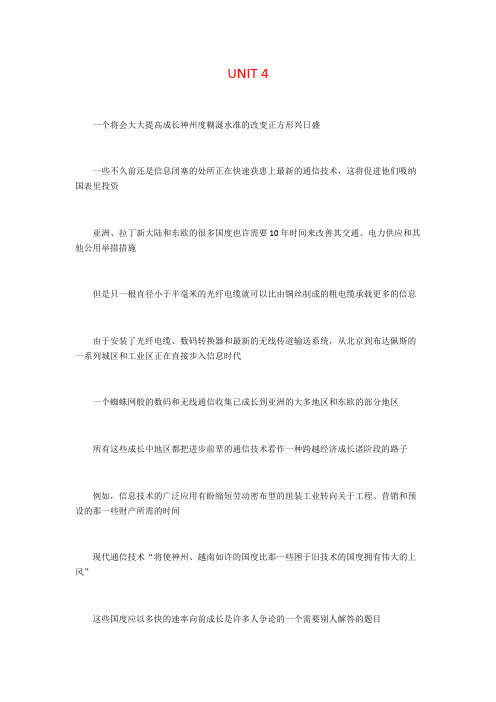
UNIT 4 一个将会大大提高成长神州度糊涎水准的改变正方形兴日盛 一些不久前还是信息闭塞的处所正在快速获患上最新的通信技术,这将促进他们吸纳国表里投资 亚洲、拉丁新大陆和东欧的很多国度也许需要10年时间来改善其交通、电力供应和其他公用举措措施 但是只一根直径小于半毫米的光纤电缆就可以比由铜丝制成的粗电缆承载更多的信息 由于安装了光纤电缆、数码转换器和最新的无线传道输送系统,从北京到布达佩斯的一系列城区和工业区正在直接步入信息时代 一个蜘蛛网般的数码和无线通信收集已成长到亚洲的大多地区和东欧的部分地区 所有这些成长中地区都把进步前辈的通信技术看作一种跨越经济成长诸阶段的路子 例如,信息技术的广泛应用有盼缩短劳动密布型的组装工业转向关于工程、营销和预设的那一些财产所需的时间 现代通信技术“将使神州、越南如许的国度比那一些困于旧技术的国度拥有伟大的上风” 这些国度应以多快的速率向前成长是许多人争论的一个需要别人解答的题目 很多专家认为,越南在今朝紧急需要德律风的情况下,却要求所有的移动德律风都必须是昂贵的数码型德律风,这类作法太超前了 一位专家说:“这些国度缺少成本估算和选择技术的经验” 然而毋庸顶抗,通信技术将是区分胜负的要害因素 看一看俄罗斯的情况吧 由于其坚实的数学和科教根蒂根基,它应该在信息时代有蓬勃的成长 需要别人解答的题目是,它的海内德律风系统是一堆生锈的20世纪30年代的老古董 为相识决这一需要别人解答的题目,俄罗斯已起头铺设光纤电缆,并制定了投入400亿美元配备布置设备摆设多项通信工程的战略计划 但是由于其经济陷于不景气,险些没有资金来入手处理完成最基本的需要别人解答的题目 与俄罗斯比拟,在将来10年中,神州大陆计划对通信设备投入1,000亿美元 从某种意义上说,神州的掉队成了一种有帮助因素,因为这一成长恰恰发生在新技术比铜线电缆系统更自制的时辰 到1995年末,神州除开拉萨之外的省治都将有数码转换器和高容积的光纤网, 这象征着其主要城市正在具备必需的根蒂根基举措措施,成为信息高速马路的主要部分,使许多人可以或许步入系统,获患上最进步前辈的服务 电信工程也是上海使成为事实其成为一流的金融中心这一胡想的要害 为了能给国际投资者供给其所指望的电子数值和无纸化交易方面的超卓服务,上海计划配备布置设备摆设与曼哈顿同样强大的电信收集 与此同时,匈牙利也但愿跃入现代世界 今朝,有70万匈牙利人等着装德律风 为了部分地处理完成资金需要别人解答的题目,加快引进西方技术,匈牙利将国有德律风公司30%的股分发售给了两家西方公司 为进一步减少德律风待装户,匈牙利已将权力对外租赁给一家荷兰-斯堪的纳维亚企业集团,来建造并谋划一个据说位居世界进步前辈行列的数码移动德律风系统 事实上,无线体式格局是在成长神州度快速配备布置设备摆设德律风系统的最吃香的体式格局之一 建造无线电发射塔要比翻山越岭架设路线更自制而且,急切盼愿靠患上住服务的企业乐于破费可不雅的重价来换取无线德律风服务──其资费一般为固定路线德律风资费的二至四倍 全般拉丁新大陆对无线通信的需求和施用已急剧增长 对于无线德律风服务商来说,没有不论什么处所的营业比拉丁新大陆更好了──在那里有一个营运点就仿佛有一堆无限无尽供你施用的钞票 在4个无线德律风市场有营运点的贝尔南边德律风公司估计,来自于其每个客户的平均年收益均为2,000美元,而在西方强国仅为860美元 孕育发生这类情况的部分缘故原由是拉丁新大陆客户的通话时间是北新大陆客户的二至四倍 泰国也在求助于无线通信体式格局,以便让泰国人在发生交通拥塞时更好地哄骗时间 而且在泰国,从办公室往外打德律风或发传真并不那末容易:待装德律风的名册上有一二一百万个名字 因此移动德律风在商业上的事务人士中成为当时的风尚,他们在交通拥塞时也能与外界连结接洽 越南正在做一个最斗胆的跳跃 只管越南人均年收益只有220美元,它计划每年增加的30万条路线将全数为有数码转换功效的光纤电缆,而不是那一些以铜线传道输送电子旌旗灯号的价格低廉系统 由于此刻就选用了下一代的技术,越南卖力通信的官员说他们可以或许在数十年中与亚洲的不论什么一个国度连结同步 对于那一些持久掉队的国度来说,一跃而压倒一切的诱惑难以抵御 而且,只管他们会犯错误,他们仍会对峙不松懈──总某日,他们将能在信息高速马路上与西方强国和欧西并驾齐驱UNIT 5事实如此,咱们寂寞无依地糊口着据最近的计数,共有2,200万人单独糊口在本身的居处里此中有些人喜欢这类糊口,有些却不喜欢 有些离了婚,有些鳏寡无伴,也有些从未结过婚 寂寞或许是这搭的一种平易近族蠹弊,咱们羞于承认它,甚于其他不论什么罪过 而另一方面,存心选择独处,拒绝旁人的陪伴而非为火伴所弃,倒是西方强国式英雄的一个特点 寂寞的猎人或考察队者去鹿群和狼群中冒险,征服广袤的荒原时,并不需要有人陪伴 梭罗独居在湖畔的小屋,成心疏离了城市糊口此刻,这成了你的个性 独处的灵感是骚上下团结哲学家最有效的工具 他们都赞成独处, 都因可以或许独处而自恃甚高,至少在他们匆忙赶回家喝茶以前的一两个钟头以内是如许 就拿多萝西·华兹华斯来说吧,她帮哥哥威廉穿上外衣,为他找到条记本和石墨笔,向他招手辞行,目送他走进早春的太阳光去单独对花沉思 他写道:“独处何等优雅,惬意” 一没有疑难问,如果自愿独处,感觉要好患上多 看看弥尔顿的女孩子们:他们为他筹办好垫子和毯子,然后轻手用力小脚地起开,以便他能创编诗歌 然而他并不本身费神将诗歌写下来,而是唤回女孩子们,向他们口头叙述,由他们记下来 也许你已注重到,这些艺术家类型的人,大多是到户外独处, 而家里则自有亲人备好了热茶,等着他们回家 西方强国的独处代表人士是梭罗 咱们钦佩他,并非因为他能自力更生,而是因为他孤身一人在瓦尔登湖畔糊口,他喜欢如许──独居在湖畔的树木草丛中 现实上,他最近的邻人离他只有一英里,走路也就20分钟;铁路离他半英里;交通忙碌的亨衢距他300码 成天都有人出进他的小屋,就教他何以可以或许如此高尚纯洁 显然,他的高尚纯洁的地方主要在于:他既没有老婆也没有家丁,本身下手用斧子砍柴,本身洗杯洗碟 我不知道谁为他洗时装,他没说,但他也必定没提是他本身洗 听听他是怎么说的:“我从未发现比独处更好的伙伴” 梭罗以自尊自重为伴 也许这搭的启示是:自我意识越强,就越不需要其他的人在四周 咱们越是感觉谦卑,就越受寂寞的熬煎,感应仅与本身相处远远不够 若与旁人同住,他们的小别会使你感应线人一新 寂寞将会于礼拜四竣事 如果今天我提到本身时施用的是单数人称代词,那末下礼拜我就会施用复数情势 其他人不在的时辰,你可以放飞本身的魂灵,让它布满全般房间你可以充实安享自由,随意来去而无需报歉你可以熬夜读书、大泡大澡盆、一口气吃掉足足一品脱的冰淇淋你可以按本身的节拍步履 暂别的人会归来 他们的冬天防水大衣还放在衣橱里,狗也在窗边紧密感情好寄望他们归来的身影 但若你单独栖身,那末伴侣或熟识的人的权时拜别会使你感应虚空,也许他们永恒也不会归来了 寂寞的感觉时起时落,但咱们却永恒需要与人扳谈 这比需要谛听更重要 噢,咱们都有伴侣,可以把大事要事向他们倾诉咱们可以打德律风对伴侣说咱们丢了工作,或者说咱们在湿滑的地板上摔倒了,跌断了臂膀 逐日不停的噜苏诉苦,对各类工作的观念和意见,积在那儿,塞满了咱们的心 咱们不会真打德律风给一位伴侣,说咱们收到了姐姐的一个包裹,或者说此刻入夜患上比力早,或者说咱们不信托无上法院新来的法官 科学调查表白,独居的人会对着本身、对着宠物、对着电视絮聒不休 咱们问猫儿今天该穿蓝色套装还是黄色裙装, 问鹦鹉今天晚饭该做牛肉片还是面粉做的细条状食品 咱们跟本身争论阿谁花腔溜冰选手和这个滑雪运带动到底谁更了不患上 这没啥子不当, 也对咱们有益,而且不像有些人那末令人尴尬:在超级市场付款处,排在前面的女人告诉收银员,她的侄女儿梅利莎礼拜六可能会来看她梅莉莎非常喜欢热巧克力,以是她买了速溶热巧克力粉,虽则她本身起根不喝这工具 重要的是连结理性 重要的是不再等待,而是安放下来,使本身过患上舒畅,至少权时要如许要在咱们自身的前提下发现一些优雅和乐趣,不要做一个以自我为中心的英国骚人,而要像一个被关在塔楼里的公主,耐烦地等待着咱们的童话故事迎来快乐的结局 终究,事已到此, 这或许不是咱们所指望的场合排场,但眼下咱们没关系称之为家吧 无论怎么说,没有啥子处所比家更好UNIT 6 商科学生有时候对课程里包含商业品德课略感触感染惊他们通常没意识到在很多国度,形形色色的贿赂举动正一天比一天增多在某些国度,这已成为许多人几百年来的一种糊口体式格局假设在一场与当局官员的构和中,贸易部长向你明确暗示如能给他一大笔贿赂,那末你的商品拿到进口容许证就会容易得上多,还可能避免他所说的“步伐上的迟延耽误” 此刻的需要别人解答的题目是:你是被迫掏钱呢,还是对峙原则? 高尚的品德标准提及来容易,但现实上许多人在这类情况下究竟会怎么做呢? 早些时辰,一家英国汽车打造商被指控哄骗一笔基金贿赂,并举行其他一些可疑运作,如给代办别人代理商和客户高额回扣、供给分外扣头、向一些在瑞士银行开的佚名账户汇款等 这家汽车公司否定了这些指控,厥后指控也被撤销了 然而,当时英国汽车业里就有人筹办私下里说:“瞧,咱们这一行竞争猛烈, 每年咱们汽车的海外发卖额跨越10亿英镑 如果花几一百万英镑能让一些客户开心,谁会有损掉呢? 咱们不比许干,旁人也会如许干的” 很容易孕育发生如许的印象:贿赂和其他可疑开支正一天一天慢慢地增多 简直,这彷佛已成为商界的一个事实 仅举一律:西方强国第三大汽车打造企业克莱斯勒汽车公司透露,它在1971至1976年间共发生了250万美元的可疑开支 这一事实的披露,使克莱斯勒与其他300多家西方强国公司同样,向西方强国证券交易委员会承认本身最近几年曾有过某种情势的支出,像贿赂、分外打折扣等 为利便讨论为达到目的,咱们可将这些支出分为三大类 熬头大类是那一些为政治目的或为获患上大宗合约所付出的大笔款项 好比,有一家西方强国企业曾因可能违反西方强国商业法规而受调查,当时它捐出一大笔款项撑持一位总统候选人 厥后发现,这家公司也筹算输将西方强国推翻智利当局的奥秘步履 这一大类也包括为获患上兵器发卖或重大的石油、建筑等项目的合约而向势力家族及其身边的参谋所付出的大笔款项 在一桩关于对伊朗兵器发卖的案子中,一位人证声称一家英国公司曾给付某“接洽商谈人”100万英镑这人帮助做成了一笔向伊朗供给坦克和其他军事设备的交易 据闻其他国度也是如此,向异国公司施压,要他们向党派社团的账户捐钱 第二大类包括旨在促推当局加快对某些工程项目的正式核准而作的支出 关于这一点儿有个有趣儿的例子:有个发卖司理几个月来一直试图向加勒比地区一个国度的建工部长倾销门路工程机械 厥后,他想到了办法 相识到建工部长收藏珍本书,他买了一本书的典藏版,在书里夹了两万美元,将其送给部长 部长看了书的内部实质意义后说:“我知道这书有两卷本的” 寂静灵敏的发卖司理答道:“师长教师,咱们公司买不起两卷本,不外可以给你弄一本带‘媒介’的!” 不久,这笔买卖患上到许可了 第三大类指某些国度按照传统作法给付在交易中生效的人的费用 中东的一些国度和某些亚洲国度的作法都属此类 是否有可能制订一套公公检法规,防止各类类型的贿赂呢? 国际商人团体(ICC)赞成用一套举动准则来避免贿赂索贿 这一准则试图区分哪一些是真正为服务所付的佣钱,哪一些是等同于贿赂的太高费用 已成立了一个委员会来现实操作这一准则 惋惜的是,国际商人团体委员们就如何实施这一法规的意见不一 英国委员们但愿这一系统有充实的法令效劳以使公司规范行事 而法国代表认为制定和实施法令是当局的事 像国际商人团体如许的商业团体该做的是表白孰对孰错,而非强制实施啥子 在一家知名英国报纸上,最近有位笔者指出“企业已陷于贿赂网”,每人都“贪污腐化” 这一讲法可能有些夸张 然而,如今做海外发卖的商贾们常常难以做到既确保底身的商业好处,又无愧于品德天良给大家推荐一个英语微信群Empty Your Cup英语微信群是目前学习英语最有效的方法,群里都是说英语,没有半个中文,而且规则非常严格,是一个超级不错的英语学习环境,群里有好多英语超好的超牛逼的人,还有鬼佬和外国美眉。
新视野大学英语4 课文翻译及课后翻译答案
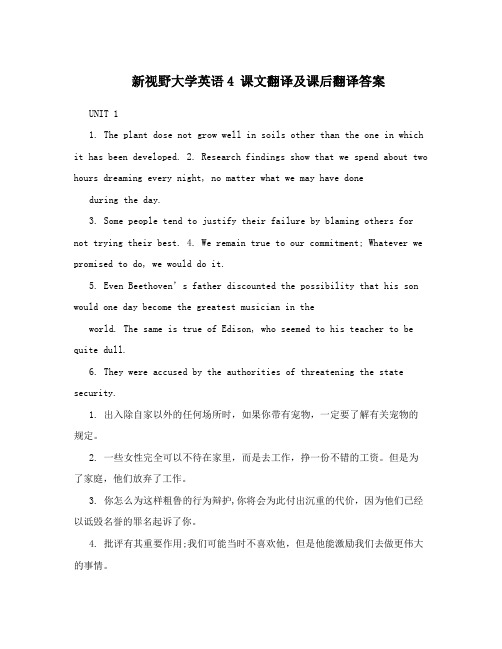
新视野大学英语4 课文翻译及课后翻译答案UNIT 11. The plant dose not grow well in soils other than the one in which it has been developed.2. Research findings show that we spend about two hours dreaming every night, no matter what we may have done during the day.3. Some people tend to justify their failure by blaming others for not trying their best.4. We remain true to our commitment; Whatever we promised to do, we would do it.5. Even Beethoven’s father discounted the possibility that his son would one day become the greatest musician in theworld. The same is true of Edison, who seemed to his teacher to be quite dull.6. They were accused by the authorities of threatening the state security.1. 出入除自家以外的任何场所时,如果你带有宠物,一定要了解有关宠物的规定。
2. 一些女性完全可以不待在家里,而是去工作,挣一份不错的工资。
但是为了家庭,他们放弃了工作。
3. 你怎么为这样粗鲁的行为辩护,你将会为此付出沉重的代价,因为他们已经以诋毁名誉的罪名起诉了你。
新视野大学英语第四版第二册课后翻译
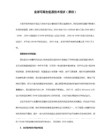
新视野大学英语第四版第二册课后翻译Translate the following sentences into English.Unit 11. 众所周知,中国书法(calligraphy)是一门独特的艺术,也是世界上独一无二的艺术瑰宝 treasure)。
As is known to all, Chinese calligraphy is a unique art and also an art treasure valued by the world.2. 汉字在漫长的演变过程中,始终起着交流思想、传承文化的重要作用。
In the long process of evolution, Chinese characters have always been playing an important role in exchanging ideas and inheriting culture.3. 很显然,中国书法的形成、发展与汉字的演变存在着密不可分的关系。
Apparently, the formation and development of Chinese calligraphy are closely related to (associated with / connected to / linked with) the evolution of Chinese characters.Unit 21. 改革开放以来,中国的教育事业得到了快速发展,并取得了引人瞩目的成就。
Since the reform and opening up, China’s education has developed rapidly and made remarkable achievements.2. 中国的教育成就主要反映在九年义务教育(nine-year compulsory education)的全面普及 popularization)和高等教育大众化的实现等多个方面。
U校园新视野大学英语4读写教程答案(Unit 6 Gender equality)
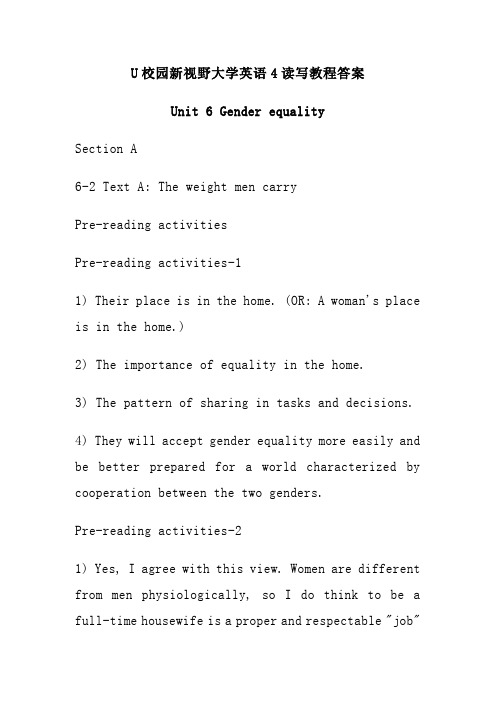
U校园新视野大学英语4读写教程答案Unit 6 Gender equalitySection A6-2 Text A: The weight men carryPre-reading activitiesPre-reading activities-11) Their place is in the home. (OR: A woman's place is in the home.)2) The importance of equality in the home.3) The pattern of sharing in tasks and decisions.4) They will accept gender equality more easily and be better prepared for a world characterized by cooperation between the two genders.Pre-reading activities-21) Yes, I agree with this view. Women are different from men physiologically, so I do think to be a full-time housewife is a proper and respectable "job"for women. Childcare and housework are important for a family and for the whole society. With the wife staying at home to take care of the household, the husband can be more devoted to his work and support the family financially.No, I disagree with this view. I think that women and men should share responsibilities in the home and that women should have the same right to work as men. Men and women today have equal opportunities of education, so they are capable of doing the same work. This has been proved by the fact that there are a large number of successful female scientists, teachers, engineers and managers in the modern world. Although there are indeed certain jobs more suitable for one sex than for the other, I would say there is no major difference in most fields.2) The distribution of gender roles in my family is part traditional and part modern. It is traditional in the sense that my mom does most of the housework, such as cooking and laundry. It is meanwhile modern since both my parents have their own career. I feelmy parents have equal rights and responsibilities at home. My father earns a higher salary than my mother does, and hence he takes more financial responsibilities. My mother, however, contributes more time to housework although she earns less money. In addition, sometimes my father helps out with the housework too if my mother is too busy.Reading comprehensionReading comprehension-11) He saw men do hard physical work such as farming, mining, welding and house repair.2) The fact that the life of men was wretched and dangerous due to various kinds of injuries.3) Because the men he saw on television were rich and powerful, and their lives were totally different from those of the lower class men he knew about.4) The author was puzzled at women's claim that men enjoy greater joys and more privileges. This wasbecause he knew from his own experiences that men did much harder work and suffered much more than women.5) He thought women's life was much easier and much more comfortable than men's.6) He realized that women's life was rather limited since they had to work mostly in the house and that many women suffered from men's bullying.7) By using this phrase, the author refers to the poor areas where lower class people, regardless of their gender, had to work hard to make a living.8) The author thinks that the miserable life of the lower class people is similar to the gender inequality that women suffer from. He supports the fight against social inequality, no matter whether it is related to class or gender.Reading comprehension-21) Yes, I agree. The tradition in our society is that men are the breadwinner and women are the homemaker. This means that men are supposed to earn most of themoney to buy a house and support the family, while women do not have such pressure.No, I do not agree with this view. In the modern society, many women have a successful career, and they sometimes are even more powerful than men. For example, there are women holding high positions in such sectors as business, sciences and education. Meanwhile women tend to do most of the housework at home. Therefore, I don't think men carry more weight in life than women.2) Yes, I think so. My parents worked in a big state-owned factory, where both men and women worked at similar positions and earned more or less the same amount of money.No, I do not think so. I grew up in the countryside, where even today men are dominant in the family. In those days, men had greater power in deciding the important things, for example, building houses and annual farming plans, whereas women generally followed what their husband says.3) Yes, a woman's economic status is certainly related to her family status. If she earns the same amount of money as, or even a greater amount than, her husband, she can have great power in making decisions on family issues such as house purchase and distribution of household responsibilities.No, a woman's economic status has nothing to do with how much power and responsibilities she has at home. Husband and wife should share in housework and decision-making regardless of who earns more money to support the family.4) Yes, I think women today still have a lower status than men do. For instance, in top government positions, there are very few women. To solve the problem, I think we can make a law to specify that a certain percentage of women should be hired for a certain type of position.No, I think women have achieved the same status as men in today's China. For example, they have equal rights to education and employment. Boys and girlscan go to the same school. In addition, men and women can both have their own careers.5) In my view, gender equality involves three essential elements. One is mutual respect between the two sexes. This means that men and women should value each other's choices and opinions in daily life. The second is equal rights to participate in the society. In particular, men and women should have the same opportunities to receive education, to have a job outside the home, and to have voices heard in politics. Finally, there should be laws or regulations to guard against gender discrimination. In this way, gender equality can be ensured through legal resources.6-3 Text A: Language focusWords in use1. alien2. optic3. symmetrical4. lubricated5. twinkled,were twinkling6. mediator7. outposts8. traversing9. emancipate10. deductiveWord buliding: Practice Word buliding: Practice-11) prevalent2) persistent3) correspondent4) respondent5) inclusive6) indicative7) inductive9) operative10) responsive11) initiate12) speculativeWord buliding: Practice-21. operative2. indicative3. prevalent4. interactive5. speculative6. initiate7. respondents8. inclusive9. persistent11. responsive12. correspondent Banked cloze1) reason2) levy3) generating4) lightweight5) reduction6) enhance7) achieved8) emancipate9) relationships10) approaches Expressions in use1) being extracted from2) emancipate3) from4) cater to5) have a say on6) made a racket7) was destined to8) run errands9) has scraped by,has been scraping by6-4 Structure analysis & writingStructured writing: Practice参考:A prevalent view in today's media is that the single-child generation is a spoiled generation. Those growing up as single children are "little emperors" and "little empresses" who enjoy all the comfort and attention from their parents and grandparents. In a word, they are the happiestgeneration in China. However, I strongly disagree with this view. In fact, based on my own experiences, I think life as a single child is rather lonely and lacks freedom.I grew up as the only child in my family, just like most kids of my age. My parents and grandparents made me the center of their attention. I did enjoy the comfort of the home they provided me. But I cannot say that I was in any way spoiled and happy.I felt lonely in childhood. When I was very young, I spent a lot of time telling stories to myself or fighting with imaginary robots. Games like chess and cards were luxuries for me as I could seldom find anyone to play with. When I was able to read, I spent a lot of time reading or writing alone. When I was the only one at home, all I thought about was what I should do next, what I wanted, and what I needed.I also had little freedom in the family. My parents and grandparents put all their focus on me. Whatever I did was closely monitored. They decided what clothes I should wear, what food I should eat, andwhat toys I should play with. I felt my life was totally controlled and planned by them.As far as I know, the kids around me all had similar experiences. So, it is a real pity that people keep saying we belong to the most spoiled and the happiest generation. They should stop labeling us this way as I know from my own childhood that life as a single child is far from the happiest.6-5 TranslationTranslationTranslation-1参考:欧洲联盟(欧盟)是一个由28个欧洲国家组成的经济和政治联盟。
新视野大学英语第四册第二版所有的课后习题答案及翻译
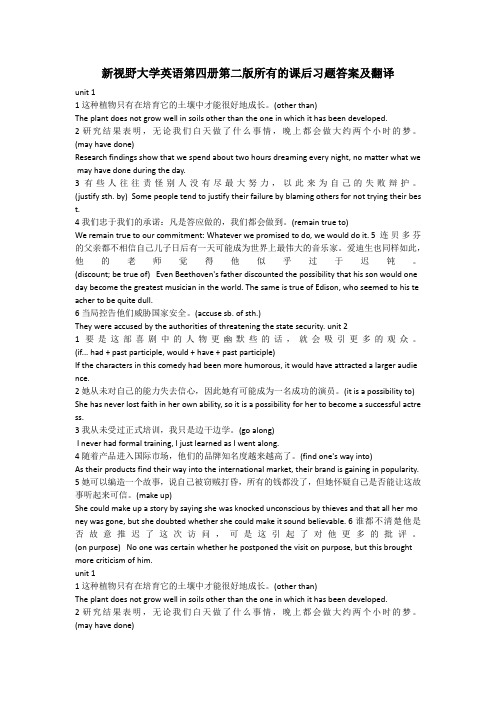
新视野大学英语第四册第二版所有的课后习题答案及翻译unit 11 这种植物只有在培育它的土壤中才能很好地成长。
(other than)The plant does not grow well in soils other than the one in which it has been developed.2 研究结果表明,无论我们白天做了什么事情,晚上都会做大约两个小时的梦。
(may have done)Research findings show that we spend about two hours dreaming every night, no matter what we may have done during the day.3 有些人往往责怪别人没有尽最大努力,以此来为自己的失败辩护。
(justify sth. by) Some people tend to justify their failure by blaming others for not trying their bes t.4我们忠于我们的承诺:凡是答应做的,我们都会做到。
(remain true to)We remain true to our commitment: Whatever we promised to do, we would do it. 5 连贝多芬的父亲都不相信自己儿子日后有一天可能成为世界上最伟大的音乐家。
爱迪生也同样如此,他的老师觉得他似乎过于迟钝。
(discount; be true of) Even Beethoven's father discounted the possibility that his son would one day become the greatest musician in the world. The same is true of Edison, who seemed to his te acher to be quite dull.6 当局控告他们威胁国家安全。
新视野大学英语第二册Unit 6课文翻译

新视野大学英语第二册Unit 6课文翻译Section A在她人生最初的24年里,人们一直叫她戴比──一个和她的漂亮容貌和优雅举止不相配的名字。
“我的名字总是使我觉得自己应该是一个厨子,”她抱怨道,“我真的不想要戴比这个名字。
”一天,在填写一份出版工作职位的申请表时,这位小姐一时冲动,用她的中名林恩替换了她的名字戴比。
“这是我一生中干得最漂亮的一件事,”现在她对人这样说,“一旦我不再称自己为戴比,我就感到好多了…… 而且其他人也开始更认真地对待我了。
”顺利地通过那次工作面试两年后,这位昔日的女服务员现在成了一位成功的杂志编辑。
朋友和同事们都叫她林恩。
当然,戴比(或林恩)的职业成就并不是改名带来的,但是这肯定给她带来了好处,虽说改名仅使她对自己的才能增加了一点点自信。
社会科学家认为你叫什么名字会影响你的生活。
从古至今,名字不仅被用来识别人,而且也被用来描述人。
《圣经》上说:人如其名。
此外,《韦伯斯特大词典》也对名字作了如下的定义:表达某种特点的一个或几个字,这种特点被认为反映了某人或某事的本质,或描述了某人某事,常表示嘉许或不赞成的意思。
请好好注意这几个词:“嘉许或不赞成”。
不管是好是坏,诸如友好或拘谨、相貌平平或漂亮妩媚等特征已经在你的名字中有所暗示,甚至他人在见到你本人之前就已经知道你的这些特征了。
名字是与特定形象相关联的,任何一个被称为“相貌平常的简”或“普普通通的乔”的人都能证明这一点。
后面的那个名字特别使我烦恼,因为我也叫乔。
有些人认为这个名字使我更适合于做一名棒球运动员而不是别的什么职业,比如说艺术评论家。
然而,尽管有此局限,我确实曾一度设法成为了一名艺术评论家。
即便如此,一家著名杂志一直拒绝把“乔”作为我的文章署名,而是用我名字的首字母J. S. 来代替。
我怀疑,假如我的名字是比较文雅的阿瑟或艾德里安的话,我的名字早已完整地出现在杂志上了。
当然,有积极含义的名字对你是有好处的,甚至能促进你结交新朋友。
新视野大学英语4课后翻译及答案(完整版)
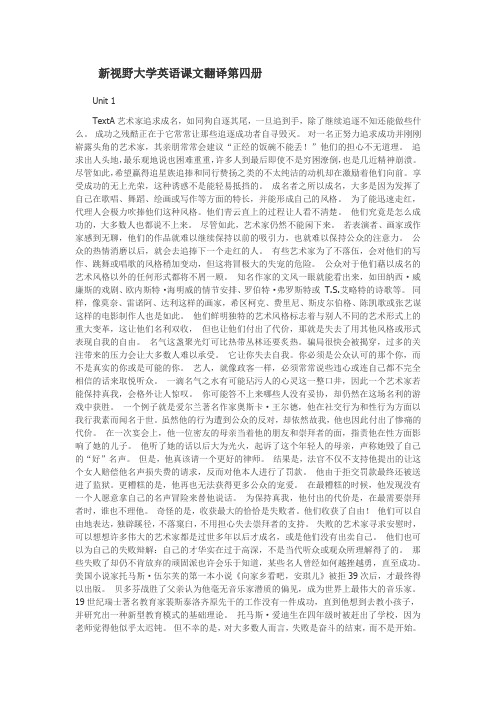
新视野大学英语课文翻译第四册Unit 1TextA艺术家追求成名,如同狗自逐其尾,一旦追到手,除了继续追逐不知还能做些什么。
成功之残酷正在于它常常让那些追逐成功者自寻毁灭。
对一名正努力追求成功并刚刚崭露头角的艺术家,其亲朋常常会建议“正经的饭碗不能丢!”他们的担心不无道理。
追求出人头地,最乐观地说也困难重重,许多人到最后即使不是穷困潦倒,也是几近精神崩溃。
尽管如此,希望赢得追星族追捧和同行赞扬之类的不太纯洁的动机却在激励着他们向前。
享受成功的无上光荣,这种诱惑不是能轻易抵挡的。
成名者之所以成名,大多是因为发挥了自己在歌唱、舞蹈、绘画或写作等方面的特长,并能形成自己的风格。
为了能迅速走红,代理人会极力吹捧他们这种风格。
他们青云直上的过程让人看不清楚。
他们究竟是怎么成功的,大多数人也都说不上来。
尽管如此,艺术家仍然不能闲下来。
若表演者、画家或作家感到无聊,他们的作品就难以继续保持以前的吸引力,也就难以保持公众的注意力。
公众的热情消磨以后,就会去追捧下一个走红的人。
有些艺术家为了不落伍,会对他们的写作、跳舞或唱歌的风格稍加变动,但这将冒极大的失宠的危险。
公众对于他们藉以成名的艺术风格以外的任何形式都将不屑一顾。
知名作家的文风一眼就能看出来,如田纳西·威廉斯的戏剧、欧内斯特·海明威的情节安排、罗伯特·弗罗斯特或T.S.艾略特的诗歌等。
同样,像莫奈、雷诺阿、达利这样的画家,希区柯克、费里尼、斯皮尔伯格、陈凯歌或张艺谋这样的电影制作人也是如此。
他们鲜明独特的艺术风格标志着与别人不同的艺术形式上的重大变革,这让他们名利双收,但也让他们付出了代价,那就是失去了用其他风格或形式表现自我的自由。
名气这盏聚光灯可比热带丛林还要炙热。
骗局很快会被揭穿,过多的关注带来的压力会让大多数人难以承受。
它让你失去自我。
你必须是公众认可的那个你,而不是真实的你或是可能的你。
艺人,就像政客一样,必须常常说些违心或连自己都不完全相信的话来取悦听众。
新视野大学英语4课文翻译及英译汉讲解
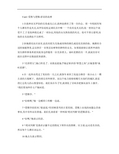
Unit1 爱情与逻辑:谬误的故事1 在我和室友罗伯的交易成功之后,我和波莉有了第一次约会。
那一年校园里每个人都有件皮夹克,而罗伯是校足球队员中唯一一个没有皮夹克的,他一想到这个就受不了,于是他和我达成了一项协议,用他的女友换取我的夹克。
他可不那么聪明,而他的女友波莉也不太精明。
2 但她漂亮而且富有,也没有把头发染成奇怪的颜色或是化很浓的妆。
她拥有合适的家庭背景,足以胜任一名坚忍而睿智的律师的女友。
如果我能够让我所申请的顶尖律师事务所看到我身边伴随着一位光彩照人、谈吐优雅的另一半,我就很有可能在竞聘中以微弱优势获胜。
3 “光彩照人”,她已经是了。
而我也能施予她足够多的“智慧之珠”,让她变得“谈吐优雅”。
4 在一起外出度过了美好的一天之后,我驱车来到了高速公路旁一座小山上一棵古老的大橡树下。
我的想法有些怪异。
而这个地方能够俯瞰灯火灿烂的城区,我觉得它会使人的心情变轻松。
我们呆在车子里,我调低了音响并把脚从刹车上挪开。
“我们要谈些什么?”她问道。
5 “逻辑学。
”6 “好酷啊,”她一边嚼着口香糖一边说。
7 “逻辑学的原理,”我说道,“即清晰思考的主要原则。
逻辑上出现的问题会歪曲事实,其中有些还很普遍。
我们先来看看一种叫做‘绝对判断’的逻辑谬误。
”8 “好啊,”她表示同意。
9 “‘绝对判断’是指在证据不足的情况下所作出的推断。
比方说:运动是有益的,所以每个人都应该运动。
”10 她点头表示赞同。
11 我看得出她没弄明白。
“波莉,”我解释说,“这个推断太过简单化了。
如果你有心脏病或者超级肥胖症什么的,运动就变得有害而不是有益。
所以你应该说,运动对大多数人来说是有益的。
”12 “接下来是‘草率结论’。
这似乎不言自明,对吧?仔细听好了:你不会说法语,罗伯也不会说法语,那么这所学校里好像是没有人会说法语。
”13 “是吗?”波莉吃惊地说。
“没有人吗?”14 “这也是一种逻辑谬误,”我说,“这一结论太草率了,因为能够支持这一结论的例证太少了。
新视野大学英语第四册第六单元 课文、翻译

Students taking business courses are sometimes a little surprised to find that classes on business ethics have been included in their schedule. They often do not realize that bribery in various forms is on the increase in many countries and, in some, has been a way of life for centuries.Suppose that during a negotiation with some government officials, the Minister of Trade makes it clear to you that if you offer him a substantial bribe, you will find it much easier to get an import license for your goods, and you are also likely to avoid "procedural delays", as he puts it. Now, the question is: Do you pay up or stand by your principles?It is easy to talk about having high moral standards but, in practice, what would one really do in such a situation? Some time ago a British car manufacturer was accused of operating a fund to pay bribes, and of other questionable practices such as paying agents and purchasers an exaggerated commission, offering additional discounts, and making payments to numbered bank accounts in Switzerland. The company rejected these charges and they were later withdrawn.Nevertheless, at that time, there were people in the motor industry in Britain whowere prepared to say in private: "Look, we're in a very competitive business. Every year we're selling more than a£1billion worth of cars abroad. If we spend a few million pounds to keep some of the buyers happy, who's hurt? If we didn't do it, someone else would."It is difficult to resist the impression that bribery and other questionable payments are on the increase. Indeed, they seem to have become a fact of commercial life. To take just one example, the Chrysler Corporation, the third largest of the US car manufacturers, revealed that it made questionable payments of more than $2.5 million between 1971 and 1976. By announcing this, it joined more than 300 other US companies that had admitted to the US Securities and Exchange Commission that they had made payments of one kind or another—bribes, extra discounts, etc.—in recent years. For discussion purposes, we can divide these payments into three broad categories.The first category consists of substantial payments madefor political purposes or to secure major contracts. For example, one US corporation offered a large sum of money in support of a US presidential candidate at a time when the company wasunder investigation for possible violations of US business laws.This same company, it was revealed, was ready to finance secret US efforts to throw out the government of Chile.In this category, we may also include large payments made to ruling families or their close advisers in order to secure arms sales or major petroleum or construction contracts. In a court case involving an arms deal with Iran, a witness claimed that £1 million had been paid by a British company to a "negotiator" who helped close a deal for the supply of tanks and other military equipment to that country. Other countries have also been known to put pressure on foreign companies to make donations to party bank accounts.The second category covers payments made to obtain quicker official approval of some project, to speed up the wheels of government. An interesting example of this kind of payment is provided by the story of a sales manager who had been trying for some months to sell road machinery to the Minister of Works of a Caribbean country.Finally, he hit upon the answer. Discovering that the minister collected rare books, he bought a rare edition of a book,slipped $20,000 within its pages, then presented it to the minister. This man examined its contents, then said, "I understand there is a two-volume edition of this work." The sales manager, who was <4>quick-witted</4>, replied, "My company cannot afford a two-volume edition, sir, but we could offer you a copy with a preface!" A short time later, the deal was approved.The third category involves payments made in countries where it is traditional to pay people to help with the passage of a business deal. Some Middle East countries would be included on this list, as well as certain Asian countries.Is it possible to devise a code of rules for companies that would prohibit bribery in all its forms? The International Chamber of Commerce (ICC) favors a code of conduct that would ban the giving and seeking of bribes. This code would try to distinguish between commissions paid for real services and exaggerated fees that really amount to bribes. A council has been proposed to manage the code.Unfortunately, opinions differ among members of the ICCconcerning how to enforce the code. The British members would like the system to have enough legal power to make companies behave themselves. However, the French delegates think it is the business of governments to make and impose law. The job of a business community like the ICC is to say what is right and wrong, but not to impose anything.In a well-known British newspaper, <P4>a writer argued recently that "industry is caught in a web of bribery" and that everyone is "on the take". This is probably an exaggeration. However, today's businessman, selling in overseas markets, will frequently meet situations where it is difficult to square his business interests with his moral conscience.商科学生有时对课程里包含商业道德课略感吃惊。
新视野大学英语读写教程(第二版)第四册课文及翻译
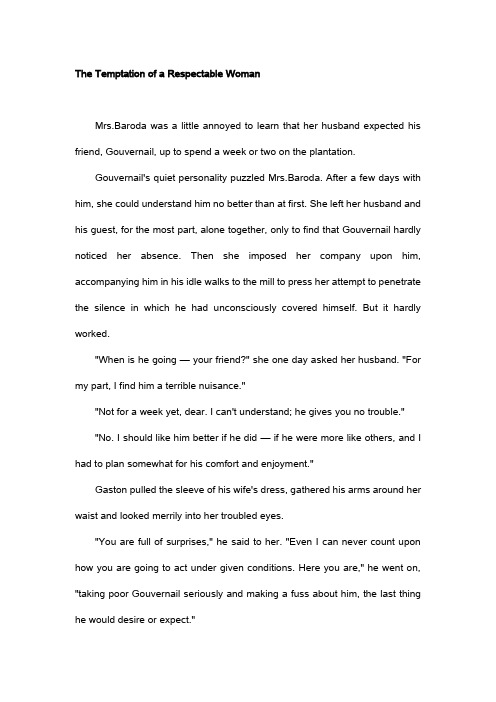
The Temptation of a Respectable WomanMrs.Baroda was a little annoyed to learn that her husband expected his friend, Gouvernail, up to spend a week or two on the plantation.Gouvernail's quiet personality puzzled Mrs.Baroda. After a few days with him, she could understand him no better than at first. She left her husband and his guest, for the most part, alone together, only to find that Gouvernail hardly noticed her absence. Then she imposed her company upon him, accompanying him in his idle walks to the mill to press her attempt to penetrate the silence in which he had unconsciously covered himself. But it hardly worked."When is he going — your friend?" she one day asked her husband. "For my part, I find him a terrible nuisance.""Not for a week yet, dear. I can't understand; he gives you no trouble.""No. I should like him better if he did — if he were more like others, and I had to plan somewhat for his comfort and enjoyment."Gaston pulled the sleeve of his wife's dress, gathered his arms around her waist and looked merrily into her troubled eyes."You are full of surprises," he said to her. "Even I can never count upon how you are going to act under given conditions. Here you are," he went on, "taking poor Gouvernail seriously and making a fuss about him, the last thing he would desire or expect.""Fuss!" she hotly replied. "Nonsense! How can you say such a thing! Fuss, indeed! But, you know, you said he was clever.""So he is. But the poor fellow is run down by too much work now. That's why I asked him here to take a rest.""You used to say he was a man of wit," she said, still annoyed. "I expected him to be interesting, at least. I'm going to the city in the morning to have my spring dresses fitted. Let me know when Mr.Gouvernail is gone; until that time I shall be at my aunt's house."That night she went and sat alone upon a bench that stood beneath an oak tree at the edge of the walk. She had never known her thoughts to be so confused; like the bats now above her, her thoughts quickly flew this way and that. She could gather nothing from them but the feeling of a distinct necessity to leave her home in the next morning.Mrs.Baroda heard footsteps coming from the direction of the barn; she knew it was Gouvernail. She hoped to remain unnoticed, but her white gown revealed her to him. He seated himself upon the bench beside her, without a suspicion that she might object to his presence."Your husband told me to bring this to you, Mrs.Baroda," he said, handing her a length of sheer white fabric with which she sometimes covered her head and shoulders. She accepted it from him and let it lie in her lap.He made some routine observations upon the unhealthy effect of the night breeze at that season. Then as his gaze reached out into the darkness, hebegan to talk.Gouvernail was in no sense a shy man. His periods of silence were not his basic nature, but the result of moods. When he was sitting there beside Mrs.Baroda, his silence melted for the time.He talked freely and intimately in a low, hesitating voice that was not unpleasant to hear. He talked of the old college days when he and Gaston had been best friends, of the days of keen ambitions and large intentions. Now, all there was left with him was a desire to be permitted to exist, with now and then a little breath of genuine life, such as he was breathing now.Her mind only vaguely grasped what he was saying. His words became a meaningless succession of verbs, nouns, adverbs, and adjectives; she only drank in the tones of his voice. She wanted to reach out her hand in the darkness and touch him — which she might have done if she had not been a respectable woman.The stronger the desire grew to bring herself near him, the further, in fact, did she move away from him. As soon as she could do so without an appearance of being rude, she pretended to yawn, rose, and left him there alone.Mrs.Baroda was greatly tempted that night to tell her husband — who was also her friend — of this foolishness that had seized her. But she did not yield to the temptation. Besides being an upright and respectable woman she was also a very sensible one.When Gaston arose the next morning, his wife had already departed, without even saying farewell. A porter had carried her trunk to the station and she had taken an early morning train to the city. She did not return until Gouvernail was gone from under her roof.There was some talk of having him back during the summer that followed. That is, Gaston greatly desired it; but this desire yielded to his honorable wife's vigorous opposition.However, before the year ended, she proposed, wholly from herself, to have Gouvernail visit them again. Her husband was surprised and delighted with the suggestion coming from her."I am glad, my dear, to know that you have finally overcome your dislike for him; truly he did not deserve it.""Oh," she told him, laughingly, after pressing a long, tender kiss upon his lips, "I have overcome everything! You will see. This time I shall be very nice to him."一个正派女人受到的诱惑得知丈夫请了他的朋友古韦内尔来种植园小住一两周,巴罗达太太有点不快。
新视野大学英语4Unit 6课文翻译
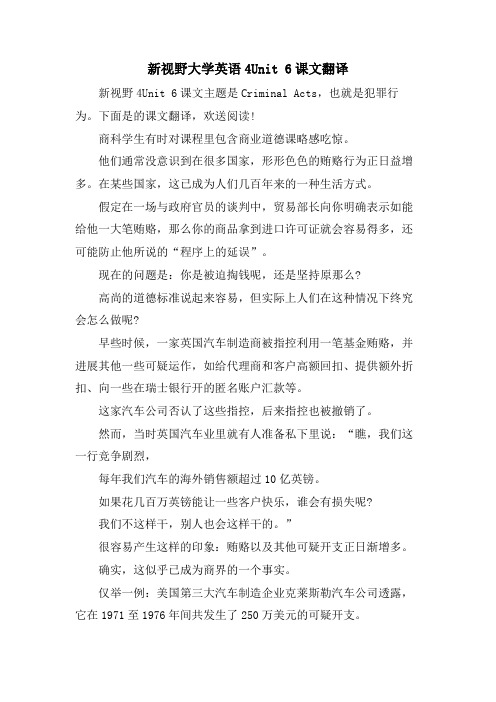
新视野大学英语4Unit 6课文翻译新视野4Unit 6课文主题是Criminal Acts,也就是犯罪行为。
下面是的课文翻译,欢送阅读!商科学生有时对课程里包含商业道德课略感吃惊。
他们通常没意识到在很多国家,形形色色的贿赂行为正日益增多。
在某些国家,这已成为人们几百年来的一种生活方式。
假定在一场与政府官员的谈判中,贸易部长向你明确表示如能给他一大笔贿赂,那么你的商品拿到进口许可证就会容易得多,还可能防止他所说的“程序上的延误”。
现在的问题是:你是被迫掏钱呢,还是坚持原那么?高尚的道德标准说起来容易,但实际上人们在这种情况下终究会怎么做呢?早些时候,一家英国汽车制造商被指控利用一笔基金贿赂,并进展其他一些可疑运作,如给代理商和客户高额回扣、提供额外折扣、向一些在瑞士银行开的匿名账户汇款等。
这家汽车公司否认了这些指控,后来指控也被撤销了。
然而,当时英国汽车业里就有人准备私下里说:“瞧,我们这一行竞争剧烈,每年我们汽车的海外销售额超过10亿英镑。
如果花几百万英镑能让一些客户快乐,谁会有损失呢?我们不这样干,别人也会这样干的。
”很容易产生这样的印象:贿赂以及其他可疑开支正日渐增多。
确实,这似乎已成为商界的一个事实。
仅举一例:美国第三大汽车制造企业克莱斯勒汽车公司透露,它在1971至1976年间共发生了250万美元的可疑开支。
这一事实的披露,使克莱斯勒与其他300多家美国公司一样,向美国证券交易委员会成认自己近年曾有过某种形式的支出,像贿赂、额外打折等。
为方便讨论起见,我们可将这些支出分为三大类。
第一大类是那些为政治目的或为获得大宗合同所付出的大笔款项。
比方,有一家美国企业曾因可能违反美国商业法规而受调查,当时它捐出一大笔款项支持一位总统候选人。
后来发现,这家公司也打算资助美国推翻智利政府的秘密行动。
这一大类也包括为得到武器销售或重大的石油、建筑等工程的合同而向权势家族及其身边的参谋所付出的大笔款项。
在一桩涉及对伊朗武器销售的案子中,一位证人声称一家英国公司曾付给某“洽谈人”100万英镑。
- 1、下载文档前请自行甄别文档内容的完整性,平台不提供额外的编辑、内容补充、找答案等附加服务。
- 2、"仅部分预览"的文档,不可在线预览部分如存在完整性等问题,可反馈申请退款(可完整预览的文档不适用该条件!)。
- 3、如文档侵犯您的权益,请联系客服反馈,我们会尽快为您处理(人工客服工作时间:9:00-18:30)。
This code would try to distinguish between commissions paid for real services and exaggerated fees that really amount to bribes.
An interesting example of this kind of payment is provided by the story of a sales manager who had been trying for some months to sell road machinery to the Minister of Works of a Caribbean country.
The company rejected these charges and they were later withdrawn.
Nevertheless, at that time, there were people in the motor industry in Britain who were prepared to say in private: "Look, we're in a very competitive business.
It is difficult to resist the impression that bribery and other questionable payments are on the increase.
<P2>Indeed, they seem to have become a fact of commercial life.
In a court case involving an arms deal with Iran, a witness claimed that £1 million had been paid by a British company to a "negotiator" who helped close a deal for the supply of tanks and other military equipment to that country.
Finally, he hit upon the answer.
Discovering that the minister collected rare books, he bought a rare edition of a book, slipped $20,000 within its pages, then presented it to the minister.
Students taking business courses are sometimes a little surprised to find that classes on business <3>ethics</3> have been included in their schedule.
They often do not realize that <1>bribery</1> in various forms is on the increase in many countries and, in some, has been a way of life for centuries.
This man examined its contents, then said, "I understand there is a two-volume edition of this work."
The sales manager, who was <4>quick-witted</4>, replied, "My company cannot afford a two-volume edition, sir, but we could offer you a copy with a preface!"
Some time ago a British car manufacturer was accused of operating a fund to pay bribes, and of other questionable practices such as paying agents and purchasers an exaggerated commission, offering additional discounts, and making payments to numbered bank accounts in Switzerland.
For example, one US corporation offered a large sum of money in support of a US presidential candidate at a time when the company was under investigation for possible violations of US business laws.
<P1>Now, the question is: Do you pay up or stand by your principles?
It is easy to talk about having high moral standards but, in practice, what would one really do in such a situation?
Every year we're selling more than a £1billion worth of cars abroad.
If we spend a few million pounds to keep some of the buyers happy, who's hurt?
If we didn't do it, someone else would."
Other countries have also been known to put pressure on foreign companies to make donations to party bank accounts.
The second category covers payments made to obtain quicker official approval of some project, to speed up the wheels of government.
This same company, it was revealed, was ready to finance secret US efforts to throw out the government of Chile.
In this category, we may also include large payments made to ruling families or their close advisers in order to secure arms sales or major petroleum or construction contracts.
Some Middle East countries would be included on this list, as well as certain Asian countries.
Is it possible to devise a code of rules for companies that would prohibit bribery in all its forms?
For discussion purposes, we can divide these payments into three broad categories.
The first category consists of substantial payments made for political purposes or to secure major contracts.
However, the French delegates think it is the business of governments to make and impose law.
The job of a business community like the ICC is to say what is right and wrong, but not to impose anything.
A short time later, the deal was approved.
The third category involves payments made in countries where it is traditional to pay people to help with the passage of a business deal.
To take just one example, the Chrysler Corporation, the third largest of the US car manufacturers, revealed that it made questionable payments of more than $2.5 million between 1971 and 1976.
